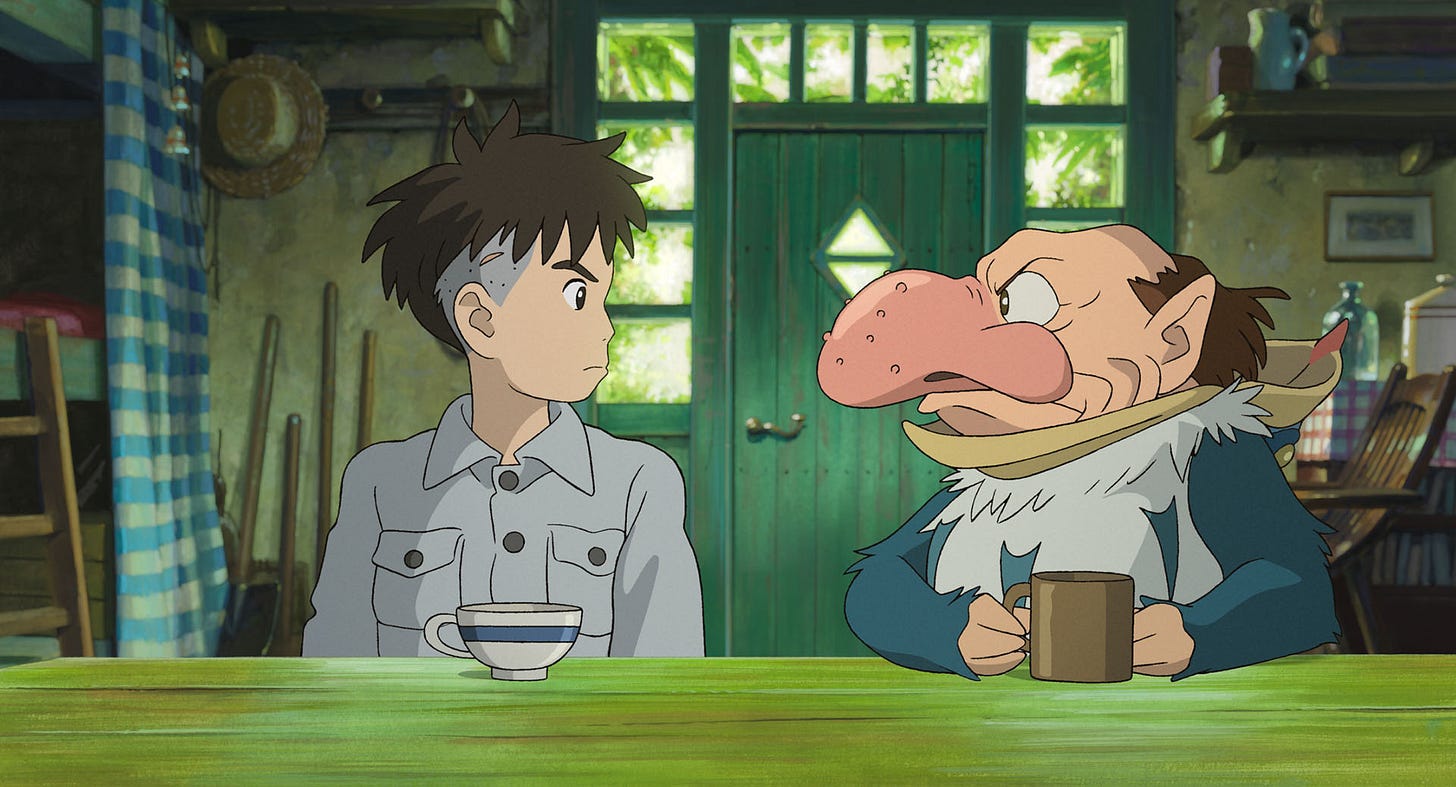'The Boy and the Heron' Is Now The Oscar Frontrunner For Best Animated Feature
Strong reviews, robust domestic box office and a "Hayao Miyazaki's curtain call" narrative gives the anime fantasy a leg up on "Across the Spider-Verse" and "Nimona"
With $1.31 million on Wednesday, down just 11% from its Tuesday earnings, GKIDS’ domestic release of The Boy and the Heron now sits at $16.8 million after six days. It should end out the week with around $18 million and (presuming a harsh second-weekend drop) around $22 million in ten days. That will be enough to place seventh among all anime films in unadjusted domestic box office. Even if it doesn’t top $30 million and thus reach sixth place, it’ll soon pass The Secret World of Arrietty ($19.2 million in 2012) as the biggest unadjusted cume for an anime film that isn’t — unlike Demon Slayer The Movie, Jujutsu Kaisen 0, two Dragon Ball flicks and two Pokemon movies — a spin-off of an ongoing anime television show.
This shows the growing spending power of anime fans and vastly increases the chances of Hayao Miyazaki’s (allegedly) final animated feature winning the 2024 Academy Award for Best Animated Feature.
Disney and Universal on the sidelines?
With Disney and Universal mostly out of the race, although nominations are still possible for the likes of Pixar’s Elementals or Illumination’s The Super Mario Bros. Movie, this year’s showdown among the year’s “best” toons was mostly seen as a face-off between Sony’s Spider-Man: Across the Spider-Verse, Paramount’s Teenage Mutant Ninja Turtles: Mutant Mayhem and Netflix’s Nimona. Neon’s Robot Dreams could have been (could still be?) the spoiler, but I digress. But the wave of strong reviews (96% fresh and 8.6/10 on Rotten Tomatoes) and a record-setting domestic box office result has turned the GKids offering into a surefire nominee and likely winner.
That the 1940’s-set war-torn melodrama sometimes plays like such a prototypical Miyazaki film that flirts with self-parody — while also acting as a kind of cinematic farewell — further helps its chances. The Academy voters will have the chance to give one of the greatest animated filmmakers of all time an Oscar for his final film, which is also his biggest (domestic) hit and is an almost definitive Miyazaki film (just like, while not my favorite, The Spy Who Loved Me is arguably the definitive 007 movie). Everything about its existence, including now its commercial success, makes it this year’s most aspirational nominee.
Spider-Man: Across the Spider-Verse was a critically acclaimed blockbuster ($690 million global) but A) it’s a superhero sequel and B) chatter about overworked animators won’t help its upworthy narrative. Mutant Mayhem is wonderfully animated and a rare IP relaunch that does something genuinely new with an oft-recycled brand. However, it wasn’t a huge hit ($180 million, with $119 million of that in North America, on a $70 million budget), and it’s still likely to be seen as “just a really good superhero toon.”
The Super Mario Bros. Movie and Elemental are most noteworthy for how much money they earned (and, in the case of the Pixar toon, how slowly it earned that money). Nimona was, like Disney’s Strange World, a pretty conventional toon elevated by having a gay protagonist. It was also (so seemingly says Netflix’s recent data dump and contrary to online frenzy) viewed about half as often this year as the 1998 Godzilla movie.
An aspirational nominee and a (potentially) feel-good winner
Mark Harris said in Grantland, when discussing the 2015 Oscars, that “Birdman, after all, is a movie about someone who hopes to create something as good as Boyhood.” There is a certain “look what we can still do” mentality to what does and doesn’t get recognized. It’s not a zero-sum game, and without arguing that the various Academy voters are a Borg-like singular entity, the winner in any number of awards categories is often a matter of which nominee makes the voter(s) feel the best.
For example, as the big-budget fantasy tentpole became more commonplace, at the expense of conventional studio programmers, such a film became less aspirational in 2012 (Harry Potter and the Deathly Hallows Part II) than in 2004 (The Lord of the Rings: The Return of the King). After all, Hollywood didn’t really need encouragement to acclaimed superhero hits like The Dark Knight or Guardians of the Galaxy. By 2019, a mid-budget, adult-skewing, star-driven character study like Green Book earning $85 million domestically was considered more aspirational, especially in contrast to a Netflix movie like Roma, than even an acclaimed $700 million-grossing (in North America) superhero flick like Black Panther.
“Look what we can do,” or “Look what we can still get audiences to embrace,” helped the Daniels’ buzzy, $143 million-plus earning (globally), word-of-mouth-powered critical smash Everything Everywhere All At Once take the top prize for A24 last year. It’s why Christopher Nolan’s Oppenheimer — a three-hour, R-rated, action-free drama that still earned $955 million global — is a tough-to-beat frontrunner this season. That the audience actually showed up, relatively speaking, further adds to the Studio Ghibli film’s value even beyond the rave reviews and the longstanding notion of Miyazaki as a god among men in his field.
Sometimes (but not always) the winner is about which nominee in a given category has the best “story.” And, to paraphrase the series finale of Game of Thrones, no likely animated feature nominee has a better story this season than Hayao Miyazaki’s The Boy and the Heron.
Of course, now that I’ve taken the time to write this, the damn movie won’t even get nominated and The Super Mario Bros. Movie will race to the winner’s circle.






Netflix seems to be leaning into the BlueSky to DNEG resurrection story in NIMONA’s FYC campaign, which is also a great narrative. Also, what the hell happened with NIMONA and the Golden Globes? Not that I needed another reason to boycott that show...